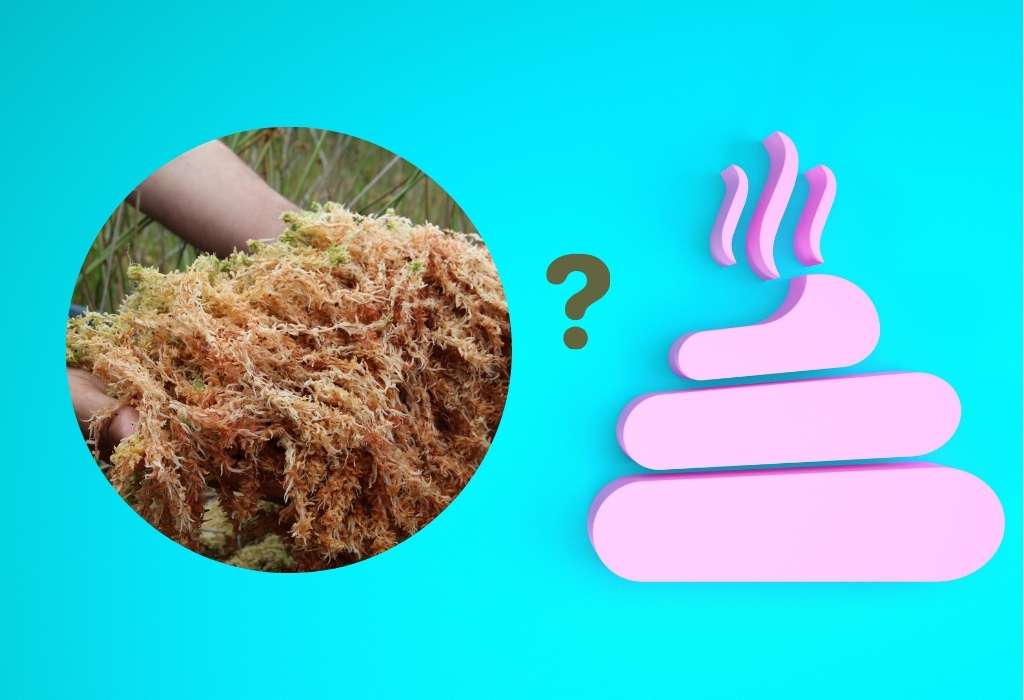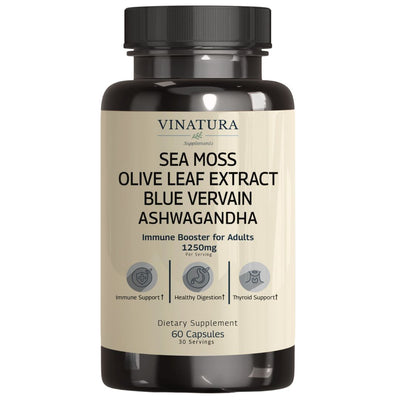
Does Sea Moss Make You Poop?
Sea moss, a superfood that has gained popularity among consumers who prefer natural ingredients for health improvement, is rich in nutrients such as potassium, iodine, magnesium, fiber, vitamins A, E, K, and 92 minerals from the ocean [1].
Before exploring further, please read the disclaimer located at the end of this webpage.
Key Takeaways
- Sea moss is a superfood with great potential for improving gut function and health.
- It promotes regular bowel movements due to its high fiber content.
- Understanding the effects of sea moss on stool and the digestive system can help you manage your sea moss consumption effectively.
What Are The Benefits Of Sea Moss For Digestion
A 2015 study conducted on mice showed that the group supplemented with sea moss experienced positive changes in gut microbiota, such as [2]:
- A 4.9-fold increase in beneficial Bifidobacterium bacteria
- A decrease in harmful bacteria like Streptococcus pneumonia and Clostridium septicum
- Higher levels of short-chain fatty acids (SCFAs), including propionic, butyric, and acetic acids, indicate a stronger production of compounds beneficial to the digestive system
- Significant improvement in colon tissue structure
- Increased plasma levels of immunoglobulins (IgA and IgG), indirectly help protect the digestive system.
Does Sea Moss Make You Poop?
The answer is yes. Based on the research analyzed above, the fiber in sea moss helps increase moisture in the stool, making it softer and promoting regular bowel movements. Therefore, after using sea moss for an extended period with the appropriate and consistent dosage, you will notice a healthier digestive system and more frequent bowel movements.
Why Does Sea Moss Make You Poop?
Sea moss contains a type of soluble fiber called mucilage, which can absorb water well and form a gel-like substance in the intestines. This helps increase moisture and soften the stool, promoting bowel movements. Additionally, mucilage can aid in the contraction of the intestines, supporting the movement of stool through the digestive tract.
Is Sea Moss a Natural Laxative?

Sea moss is not classified as a traditional laxative, but its high fiber content and the solubility of mucilage provide a mild laxative effect. It helps users maintain regular bowel movements, creating a natural, gentle laxative effect throughout sea moss use.
Can Sea Moss Lead to Diarrhea?
In some cases, consuming too much sea moss can lead to diarrhea or digestive discomfort, especially if your body is not accustomed to high-fiber foods. Therefore, it's best to start with a small amount of sea moss to observe how your body reacts and allow your digestive system to gradually adjust before increasing the dosage.
Does Sea Moss Detoxify Your Stomach?
The answer is yes, but sea moss's detoxification effect on the stomach is indirect, as it supports natural digestive functions rather than directly removing toxins from the stomach. If you are looking for a product that provides thorough stomach detoxification, sea moss may not fully meet those needs.
Can Sea Moss Alter Stool Color?
No, sea moss does not significantly alter stool color. Any changes in stool color would depend on the individual's diet. If you notice any changes in stool color during sea moss use, you should review your diet and consult a doctor.
Does Sea Moss Cause Constipation?

Sea moss typically helps promote more regular bowel movements rather than causing constipation. However, if you do not drink enough water while using sea moss, constipation can still occur. Therefore, remember to stay hydrated to ensure your digestive system functions well in combination with sea moss.
Does Sea Moss Affect Stool Odor?
There is no research indicating that sea moss affects stool odor. However, stool odor can change depending on diet rather than sea moss itself. It is advisable to monitor your condition while using sea moss, and if you notice any unusual symptoms, consult with healthcare professionals for advice.
Does Sea Moss Make You Poop Green?
The answer is no. Green stool may result from using sea moss in combination with a diet rich in green vegetables or foods with green coloring. Therefore, there is no need to worry if your diet includes many green foods; in fact, this can contribute to a healthier digestive system.
Does Sea Moss Make You Poop Mucus?
Mucus in stool is a sign of digestive issues such as inflammation or infection. There are no reports linking sea moss to increased mucus production in stool. If you are experiencing this condition, it is best to consult a healthcare professional for accurate advice.
How To Manage Sea Moss Gel Consumption And Digestion
To manage the consumption of sea moss gel and avoid digestive discomfort, it is advisable to consult a doctor before use. Additionally, you can start with a small amount—1 tablespoon of gel per day—to allow your body to adjust, and then gradually increase to 1-2 tablespoons per day to ensure effectiveness.
Frequently Asked Questions
Can Sea Moss Cause Gas?
Sea moss can cause gas if your body is not accustomed to consuming high-fiber foods. If you experience this, reduce the amount of sea moss you are taking to allow your body to adjust, and gradually increase the dosage once the bloating decreases.
Does Sea Moss Reduce Bloating?
Sea moss can help reduce bloating because it supports digestion and improves gut health. However, consuming a large amount of sea moss suddenly may still cause temporary bloating until your body adjusts.
Is Sea Moss Considered a Probiotic?
Sea moss is not considered a probiotic, but it creates an environment that indirectly supports the growth of beneficial bacteria in the gut, thereby helping to maintain a balanced gut microbiome.
Does Sea Moss Increase Urination?
In some cases, sea moss may increase urine frequency due to its high potassium content and mild diuretic properties.
Can Sea Moss Cause Nausea?
In some cases, sea moss may increase urine frequency due to its high potassium content and mild diuretic properties.
Conclusion
Sea moss can be a good natural option if you're looking to support regular bowel movements. However, it is not a laxative, so you should consider an appropriate dosage based on your health and body condition.
References
- [1] International Journal of Agriculture and Food Science Technology (2014), (Special Issue) - Seaweed: A potential “Superfood” unexplored and untapped Volume 5, Number 6, pp. 631-642
- [2] BMC Complement Altern Med. 2015; 15: 279: Prebiotic effects of diet supplemented with the cultivated red seaweed. Published online 2015 Aug 14. doi: 10.1186/s12906-015-0802-5
Author

Product Disclaimer
Including an ingredient or study does not evaluate, endorse, or recommend any Vinatura product or any third-party product. Some ingredients discussed may not be used in any Vinatura product.
The content of the articles has not been evaluated by the Food and Drug Administration (FDA) and is not intended to promote or endorse any specific product. Any products sold on this website are not intended to diagnose, treat, cure, or prevent any disease.
Opinions and Endorsements
Any claims, statements, or opinions expressed in the articles are those of the author(s) and do not necessarily reflect the views or opinions of the manufacturers of the dietary supplement products. The products sold on this website are separate from the content of the articles and are not directly endorsed or associated with the information presented here.
Liability Disclaimer
The author(s) of the articles, website, and manufacturers of the dietary supplement products do not assume any liability for any potential consequences arising from the use of the information provided in the articles. Ingredient effects, dosages, and safety vary by individual, formulation, and context; some ingredients interact with medications or may be unsuitable during pregnancy or lactation. It is recommended that individuals consult with a qualified healthcare professional before making any dietary or lifestyle changes, including the use of dietary supplements.
Product Usage
Please refer to the product labels and packaging for specific usage instructions and guidelines for the dietary supplement products sold on this website.
Customer Support
For any concerns or questions regarding the dietary supplement products, please contact our customer support team, who will be more than happy to assist you.





Leave a Comment
Be the first to comment.
What do you think?